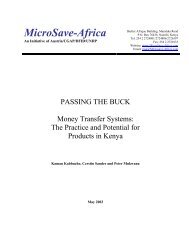You also want an ePaper? Increase the reach of your titles
YUMPU automatically turns print PDFs into web optimized ePapers that Google loves.
In the early 1990s,<br />
<strong>DAI</strong> had staff working<br />
in Poland as USAID<br />
advisors and on<br />
banking projects. That<br />
presence grew as the<br />
1990s progressed.<br />
54<br />
able hours (direct labor) and overhead costs.<br />
The picture did not get any brighter in the first<br />
few months <strong>of</strong> 1995. In April, management<br />
decided it would have to bite the bullet, and for<br />
the first time in the company’s history carried<br />
out a lay<strong>of</strong>f, affecting 17 individuals, or 14 percent<br />
<strong>of</strong> the home <strong>of</strong>fice staff. Several were <strong>DAI</strong><br />
veterans who seemed to have lost their passion,<br />
or whose skills were no longer in demand.<br />
This was a painful process, and Mickelwait in<br />
particular took it as “something <strong>of</strong> a personal<br />
failure.” But his candor and directness persuaded<br />
the remaining staff that it was a necessary<br />
decision, and that <strong>DAI</strong> would quickly recover.<br />
He was right.<br />
Rather than assuming a defensive posture,<br />
Mickelwait took some bold steps to move <strong>DAI</strong><br />
away from its historical dependence on USAID<br />
and gain new business from other clients,<br />
including foreign governments and multilateral<br />
development banks, such as the Asian Development<br />
Bank (ADB) and the European Bank for<br />
Reconstruction and Development (EBRD). Regional<br />
<strong>DAI</strong> <strong>of</strong>fices had not been necessary when<br />
USAID was the sole customer, and although<br />
the Jakarta <strong>of</strong>fice experiment <strong>of</strong> 1980–1982 had<br />
failed, there was reason to think that a country<br />
presence was critical in gaining access to<br />
foreign government clients and projects funded<br />
by multilateral development banks. Establishing<br />
such local footprints, therefore, became key



